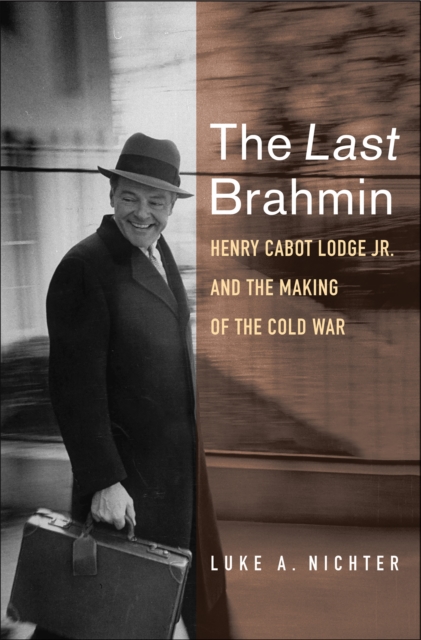
The Last Brahmin : Henry Cabot Lodge Jr. and the Making of the Cold War EPUB
by Nichter Luke A. Nichter
EPUB
Please note: eBooks can only be purchased with a UK issued credit card and all our eBooks (ePub and PDF) are DRM protected.
Description
The first biography of a man who was at the center of American foreign policy for a generation
Few have ever enjoyed the degree of foreign-policy influence and versatility that Henry Cabot Lodge Jr. did—in the postwar era, perhaps only George Marshall, Henry Kissinger, and James Baker. Lodge, however, had the distinction of wielding that influence under presidents of both parties. For three decades, he was at the center of American foreign policy, serving as advisor to five presidents, from Dwight Eisenhower to Gerald Ford, and as ambassador to the United Nations, Vietnam, West Germany, and the Vatican.
Lodge’s political influence was immense. He was the first person, in 1943, to see Eisenhower as a potential president; he entered Eisenhower in the 1952 New Hampshire primary without the candidate’s knowledge, crafted his political positions, and managed his campaign. As UN ambassador in the 1950s, Lodge was effectively a second secretary of state. In the 1960s, he was called twice, by John F. Kennedy and by Lyndon Johnson, to serve in the toughest position in the State Department’s portfolio, as ambassador to Vietnam. In the 1970s, he paved the way for permanent American ties with the Holy See. Over his career, beginning with his arrival in the U.S. Senate at age thirty-four in 1937, when there were just seventeen Republican senators, he did more than anyone else to transform the Republican Party from a regional, isolationist party into the nation’s dominant force in foreign policy, a position it held from Eisenhower’s time until the twenty-first century.
In this book, historian Luke A. Nichter gives us a compelling narrative of Lodge’s extraordinary and consequential life. Lodge was among the last of the well'heeled Eastern Establishment Republicans who put duty over partisanship and saw themselves as the hereditary captains of the American state. Unlike many who reach his position, Lodge took his secrets to the grave—including some that, revealed here for the first time, will force historians to rethink their understanding of America’s involvement in the Vietnam War.
Few have ever enjoyed the degree of foreign-policy influence and versatility that Henry Cabot Lodge Jr. did—in the postwar era, perhaps only George Marshall, Henry Kissinger, and James Baker. Lodge, however, had the distinction of wielding that influence under presidents of both parties. For three decades, he was at the center of American foreign policy, serving as advisor to five presidents, from Dwight Eisenhower to Gerald Ford, and as ambassador to the United Nations, Vietnam, West Germany, and the Vatican.
Lodge’s political influence was immense. He was the first person, in 1943, to see Eisenhower as a potential president; he entered Eisenhower in the 1952 New Hampshire primary without the candidate’s knowledge, crafted his political positions, and managed his campaign. As UN ambassador in the 1950s, Lodge was effectively a second secretary of state. In the 1960s, he was called twice, by John F. Kennedy and by Lyndon Johnson, to serve in the toughest position in the State Department’s portfolio, as ambassador to Vietnam. In the 1970s, he paved the way for permanent American ties with the Holy See. Over his career, beginning with his arrival in the U.S. Senate at age thirty-four in 1937, when there were just seventeen Republican senators, he did more than anyone else to transform the Republican Party from a regional, isolationist party into the nation’s dominant force in foreign policy, a position it held from Eisenhower’s time until the twenty-first century.
In this book, historian Luke A. Nichter gives us a compelling narrative of Lodge’s extraordinary and consequential life. Lodge was among the last of the well'heeled Eastern Establishment Republicans who put duty over partisanship and saw themselves as the hereditary captains of the American state. Unlike many who reach his position, Lodge took his secrets to the grave—including some that, revealed here for the first time, will force historians to rethink their understanding of America’s involvement in the Vietnam War.
Information
-
Download - Immediately Available
- Format:EPUB
- Pages:520 pages
- Publisher:Yale University Press
- Publication Date:22/09/2020
- Category:
- ISBN:9780300256178
Information
-
Download - Immediately Available
- Format:EPUB
- Pages:520 pages
- Publisher:Yale University Press
- Publication Date:22/09/2020
- Category:
- ISBN:9780300256178






